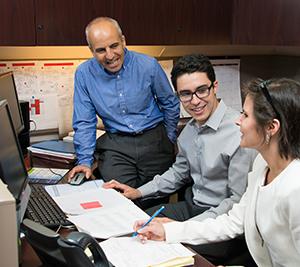 Americans fear few things more than the Internal Revenue Service. Immigrants face even greater fear and confusion when confronting challenges with the IRS, as they strive to navigate a confusing tax code in their new country. Enter California State University, Northridge and the Bookstein Institute for Higher Education in Taxation.
Americans fear few things more than the Internal Revenue Service. Immigrants face even greater fear and confusion when confronting challenges with the IRS, as they strive to navigate a confusing tax code in their new country. Enter California State University, Northridge and the Bookstein Institute for Higher Education in Taxation.
Launched in 2005 at CSUN with the support of an endowment created by philanthropist and longtime public accountant Harvey Bookstein ’70 (Business Administration) and his wife, Harriet, the institute assists about 130 low-income taxpayers each year — free of charge. The clinic opened in 2008 and is the only one of its kind in Los Angeles County.
“Students really benefit as well,” said Rafi Efrat ’89 (Accounting Theory and Practice), institute director and professor of accounting. “They work as a team, made up of a senior accounting student studying federal tax procedures, and a supervising graduate student. They meet with clients here on campus, gather information and do research on tax issues.”
Faculty member John Balian ’89 B.S., M.S.T. (Accounting Theory and Practice), a former IRS agent, approves each recommendation the students make to their clients, Efrat said. Each student serves about four clients during a semester, and the clinic operates year-round. Clients may be facing an IRS audit or other “controversies” (in taxation parlance) such as wage or pension garnishment, or the need for a payment plan or non-payment status while they regain their financial footing.
Jonathan McCormick, a graduate student supervisor for the clinic, shared the story of one client, Melanie, whose case proved as rewarding for the student clinicians as it did for their client.
“Melanie faced a tax debt of over $27,000 for many years of overdue taxes,” said McCormick, a student in the institute’s master of science in taxation program. “She had already started some of the work herself, so she was not facing collection action by the IRS when she started with the clinic. We resolved this case with an accepted offer in compromise — $639 for a balance due.
“Now the client has received her fresh start,” he said. “As the supervisor for this case, the best lesson was the relief and enjoyment of the clinician when the IRS finally decided to agree to accept the offer in compromise.”
The service is so popular that it has a waiting list, and most clients come to the program by referral from the IRS website or word of mouth.
“There was a clear need — there was no full-service clinic that served low-income taxpayers here,” said Efrat, who recently received the 2014 Outstanding Educator Award from the California Society of Certified Public Accountants. “We have an immigrant population that really doesn’t know how to communicate with the IRS.
“That type of plight leads to so many other problems,” he added. “Being able to help them in that area frees them up to concentrate on other parts of their lives.”
The federal government recognizes the clinic’s community service as well. The U.S. Department of the Treasury has supported the program with matching grants since its inception, this year awarding $70,000 in matching funds. In September, the IRS also recognized the contributions of the Bookstein Institute, presenting Efrat with its Excellence in Partnering Award.
The clinic grew out of the institute’s master of science in taxation program, and many of the graduate students are supported by scholarships from the institute’s endowment. The institute is operated within the David Nazarian College of Business and Economics at CSUN.
In addition to the tax clinic, Bookstein Institute graduate students — approximately half of whom are immigrants themselves — travel around Los Angeles presenting workshops in several languages. Popular topics include the earned-income tax credit and payroll tax FAQs for small-business owners. The students offer about 30 workshops each year, reaching about 700 Angelenos.
“We wanted to offer students experiential learning and provide support for community needs,” Efrat said.
CSUN students are embracing the opportunities.
“The tax clinic is a great way to learn a whole different world of tax that most tax practitioners have no experience with,” McCormick said. “The IRS collection process is something that has rules of its own.”
This article originally appeared on csunshinetoday.csun.edu
By: Herstein, Olivia L

